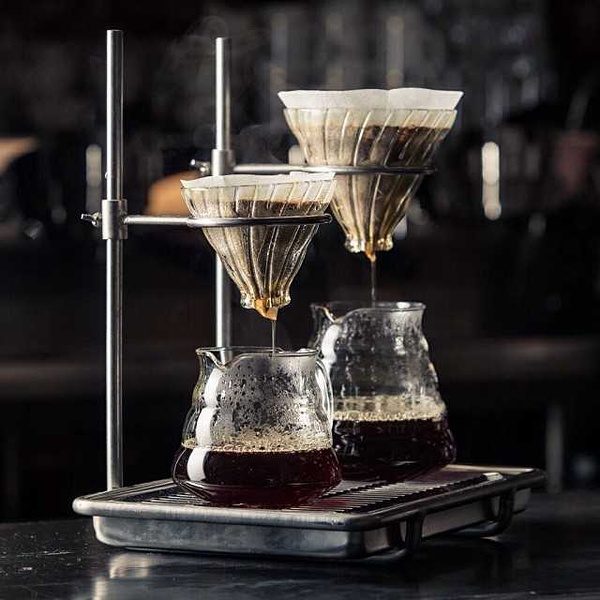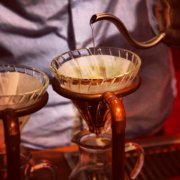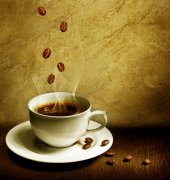From a poor family, the king of Vietnamese coffee, Asian coffee, Vietnamese coffee.

At 07:50 on a warm morning in Hanoi, the "king of philosophy" of Vietnam's powerful coffee industry was enjoying the first cigar of the day, with only the last two inches left. General manager Dang Le Nguyen Vu, who dresses casually and wears a Panamanian straw hat, is said to prefer Cuban-made Cohiba cigars, but this one is Davidoff, "German brand," he told me through an interpreter. He also asked me to have one, but it seems too early to smoke at this point.
Except in Central Plains Coffee (Trung Nguyen Corp.) Apart from the headquarters in Ho Chi Minh City, you can occasionally see him in the huge coffee plantations in the central highlands. On his estate, there are as many as 120 horses in the stables alone.
Westerners doing business in Vietnam estimate Deng Li's personal wealth at more than $100m, an incredible figure in a country with a per capita income of just $1300.
On this day, Deng Li Yuan Yu, known as Chairman Yu (Chairman Vu), came to the Vietnamese capital to meet with the Prime Minister and the Minister of Agriculture to discuss coffee policy. So he chose a Central Plains coffee shop closest to the center of power for morning coffee and cigars, in fact, in the heart of Hanoi, so much so that it was demolished a few weeks later-making room for the Vietnamese parliament building.
Like many of his compatriots, Deng Li Yuanyu also collects a bust of Ho Chi Minh (the Vietnamese like to call him "Uncle Hu")-Ho Chi Minh's mausoleum is not far from the coffee shop. But what would he think of the 41-year-old capitalist as a communist revolutionary?
If Ho Chi Minh knew anything under the spring, he might appreciate Deng Li Yuanyu's so-called "caffeism." He points out that Vietnam, like most other coffee-growing countries, is a poor tropical country, usually receiving only $1 for every $20 created by the global coffee industry, while most of the profits are grabbed by multinationals such as Nestl and Starbucks. "Why should we obey this order?" He asked. Deng Li Yuanyu pointed out that Central Plains coffee products have now been exported to 60 countries and have been further expanded in China and the United States, and Vietnam is expected to continue to upgrade in the multibillion-dollar global coffee industry chain.
Dang Xuan Minh, a member of the Vietnamese Communist Party and founder of AVM, a mergers and acquisitions consultancy, says Uncle Hu wants Vietnam to prosper. He also pointed out that October 13 has been designated as Vietnamese Entrepreneur Day because Ho Chi Minh sent a letter to Vietnamese businessmen on October 13, 1954, thanking them for their financial support in the anti-French struggle.
Vietnam has emerged a group of capitalists, their spirit of daring to take risks in this ever-changing society is exciting, and Deng Li Yuanyu is one of the best. Zhongyuan Coffee has not yet gone public, so there are few financial data disclosed, but its spokesman said revenue reached $151 million in 2011 and is expected to grow by 78 per cent this year.
Like Vietnam, although China has a long tea culture, coffee has great potential for development, and the instant coffee products of Central Plains Coffee are constantly expanding the market in China. Deng Li Yuanyu has made no secret of the company's plans for aggressive expansion. Zhongyuan Coffee plans to go public within two years and will bypass Vietnam's smaller capital market and enter an international exchange. Within the company, Deng Li Yuanyu is also pushing ambitious strategic plans, involving $800 million in factories and other investments over the next decade.
Mr Deng acknowledges that such plans may be hampered by long-standing tensions between China and Vietnam, but he thinks like many western managers. In the words of a spokesman for the company, "We want every Chinese to spend $1 a year on our coffee products."
Vietnam's economic liberalization is often criticized for the proliferation of crony capitalism, and Deng Li Yuanyu was born humble, which is one of the reasons why he is respected. Nguyen Viet Khoi, a professor at Vietnam University of Economics and Trade, pointed out that he was "self-made".
In 1986, the Vietnamese government admitted that the centrally planned economy would not work in a country devastated by decades of war and heavily dependent on its own declining Soviet Union, that a country full of rice paddies needed to import rice to feed its hungry people. so it launched the economic reform called "reform and opening up", when Deng Liyuan Yu was a high school student. Vietnam's economy, which was hot and cold and fluctuated with the will of its leaders, has become what its government calls "market-oriented socialism."
It is said that running a large business in Vietnam is inseparable from the "umbrella" provided by influential officials. Today, Deng Li Yuanyu may also have a few umbrellas, but his childhood is no different from that of other plateau farmers-taking care of his family's fields, feeding pigs and helping his mother make bricks for a nearby brick kiln. He did well at school and was admitted to Nishihara University (Tay Nguyen University) in Bang Mei Shu, the coffee capital of Vietnam, as a pre-med student.
Deng Li Yuanyu and his classmates like coffee very much, and in his third year of college, he realized that he didn't want to be a doctor. When he told his mother that he planned to do well in Vietnam's booming coffee industry, the latter burst into tears.
He bought the first coffee roaster, rented a small room and painted the sign Trung Nguyen (which originally means "Central Plateau"). Deng Li Yuanyu recalls that his venture capital is actually the "trust" of some coffee growers. They provide coffee beans, while Deng Li Yuanyu promises to share the sales revenue. At first he delivered coffee by bike, but later he upgraded to a motorcycle. Today, 15 years later, his company has 3000 employees, including its own fleet of trucks.
Today, Deng Li Yuanyu's parents live in his mansion on the outskirts of Bang Mei and Shu, where Central Plains Coffee has a "coffee village", museums and conference rooms. In addition to breeding racehorses, Deng Li Yuanyu also collected dozens of celebrity bust portraits, including Mao Zedong, Napoleon, Balzac and Beethoven. Why? "Great changes are often caused by individual great men, not by a group of people." He explained.
The rise of Deng Li Yuanyu is not without controversy. He is featured in a book written by Vietnamese scholars (excluding Nguyen Viet Khoi), whose title can be translated as "talented people deserve to be successful" (Talented and Deservingly So). The book describes 10 Vietnamese, as well as foreigners such as Bill Bill Gates and Thomas Thomas Edison-all historical figures except Deng Li Yuan Yu. Deng Li Yuanyu's chapter is 42 pages long, while Ho Chi Minh's part is only 25 pages. Many media are deeply disturbed, and a related news headline is "it is shocking that the new book compares the general manager of Central Plains Coffee with a great man." Deng Li Yuanyu issued an open letter refuting the claim that he had "bought" praise and thanked the critics, saying that public discussion was good for the country.
Deng Li Yuan Yu has helped train other entrepreneurs and has become an unofficial Vietnamese ambassador for economic development. He has spoken in front of organizations such as MIT Sloan scholars and chaired international conferences on coffee. Peter Timmer, a professor at Harvard University and a food safety scholar who often visits Asia, said he had many long conversations with Deng Li Yuanyu.
"I think Deng Li Yuanyu is very smart, from a business point of view, he is a real leader, he has a clear vision of what the company can do, and he can communicate this vision to all employees," Timo said. "they believe it and are very efficient, which in turn contributes to the realization of this vision."
He added: "this is the case with Henry Ford, the case with George George Eastman, and the case with Steve Jobs. I'm not sure whether Deng Li Yuanyu can be compared with these great entrepreneurs, but I do think he is one of the most successful entrepreneurs in Southeast Asia. "
Vietnam joined the World Trade Organization in 2007, and its economy is growing at an annual rate of around 7%, except for the recent slowdown caused by the government's efforts to control severe inflation. Vietnam's coffee industry, once negligible in export volume, is now the second-largest exporter after Brazil, driven by World Bank loans.
In a meeting with Vietnamese leaders, Deng Li Hara Yu said he was promoting a "cluster" strategy to transform the coffee-growing country into a coffee power that combines roasting, processing and export. "although growth can be seen in the economic data, I don't think the past model will work in the future," he explained. "We need a new formula for success."
Zhongyuan Coffee recently opened a fifth processing plant to support the export of instant coffee to China and South Korea, which the company says is growing at an annual rate of more than 25%.
In Vietnam, Zhongyuan Coffee owns 42 coffee shops, and thousands of coffee shops use its brand. Zhongyuan Coffee is also very popular in grocery stores. According to ACNielsen, Zhongyuan Coffee sells more coffee in Vietnam than Nestle Coffee and Vina-cafe Bien Hoa Coffee, owned by the Vietnamese conglomerate Masan Group.
Deng Li Yuanyu has a model plantation that uses irrigation systems from Israel and special fertilizers produced in Finland, hoping to improve the yield and quality of Vietnamese coffee. Vietnam is now the world's largest producer of Robusta coffee beans, but the beans are rough and cheap, and Deng Li Yuanyu wants to expand the acreage of Arabica coffee, which tastes better and costs more.
Deng Li Yuanyu's caffeism contains his personal belief that coffee helps to liberate the mind, stimulate creativity and promote progress. This seems to attribute Microsoft, Amazon and junk rock to street vendors in Seattle. "it's absurd to see coffee drinking as a major sign of progress and innovation," Timo said, "but he really seems to believe it."
The high-end Central Plains coffee (Legendee) package is printed with a portrait of Honore de Balzac (Honor de Balzac), as well as his famous saying: "when we drink coffee, our thoughts are like an army!" Like many Vietnamese, Deng Li Yuanyu seems reluctant to talk about politics. "what we emphasize is the creativity and creative energy that people can use to change their lives," he said. "
As the morning interview drew to a close, Deng Li Yuanyu suggested that instead of using the Taoist theory of yin and yang to explain Vietnamese culture, it would be better to use two native legendary animals-turtles and dragons. The turtle is tough, patient and persevering, and can wait for adversity to subside. This is exactly what happened to the soldiers who fought in the famous Guzhi tunnel, lurking like turtles during the day and taking off like dragons at night, which is how they repelled the US military 40 years ago. The dragon is an imaginary creature that represents luck, courage and action to pursue dreams. "if you don't have a dream, how can you make it come true?" Deng Li Yuanyu had already put out the cigar. "if there is no action, how can there be a good result?"
But the spirit of the tortoise is equally important, he added. "do you want to know the ratio of turtles to dragons in the spirit of Central Plains Coffee Enterprise?" He grinned. "I think it's 40% turtle, 60% dragon."
Original address: www.forbeschina.com/register/active.php?user=seanli&key=Q8UJ0xAxzh
Important Notice :
前街咖啡 FrontStreet Coffee has moved to new addredd:
FrontStreet Coffee Address: 315,Donghua East Road,GuangZhou
Tel:020 38364473
- Prev

American scientists suggest the best time to drink coffee
According to a special feature of Xinhua Agency (Huang Min), for coffee lovers, some people are used to having a cup in the morning, and some people like to drink in the afternoon. A neurologist in the United States found that caffeine interacts with the hormone cortisol in the body to produce a better refreshing effect. According to the cycle of cortisol levels, the best time to drink coffee is 9:30 am to 11:30 am. Cortisol is not only a stress hormone, it also helps regulate
- Next

Colombian Coffee has become the most expensive Coffee in the World
According to a report in the Colombian Times on November 6, a study by the Colombian coffee planting competitiveness investigation team shows that at present, the price of Colombian coffee with a production cost of more than US $2700 per ton is the highest in the world, while the average production cost of coffee in Latin America is US $1450 per ton, while the global average is only US $1400 per ton. Although the Colombian government subsidizes coffee farmers, Costa Rican coffee exports account for the world's coffee.
Related
- Detailed explanation of Jadeite planting Land in Panamanian Jadeite Manor introduction to the grading system of Jadeite competitive bidding, Red bid, Green bid and Rose Summer
- Story of Coffee planting in Brenka region of Costa Rica Stonehenge Manor anaerobic heavy honey treatment of flavor mouth
- What's on the barrel of Blue Mountain Coffee beans?
- Can American coffee also pull flowers? How to use hot American style to pull out a good-looking pattern?
- Can you make a cold extract with coffee beans? What is the right proportion for cold-extracted coffee formula?
- Indonesian PWN Gold Mandrine Coffee Origin Features Flavor How to Chong? Mandolin coffee is American.
- A brief introduction to the flavor characteristics of Brazilian yellow bourbon coffee beans
- What is the effect of different water quality on the flavor of cold-extracted coffee? What kind of water is best for brewing coffee?
- Why do you think of Rose Summer whenever you mention Panamanian coffee?
- Introduction to the characteristics of authentic blue mountain coffee bean producing areas? What is the CIB Coffee Authority in Jamaica?

